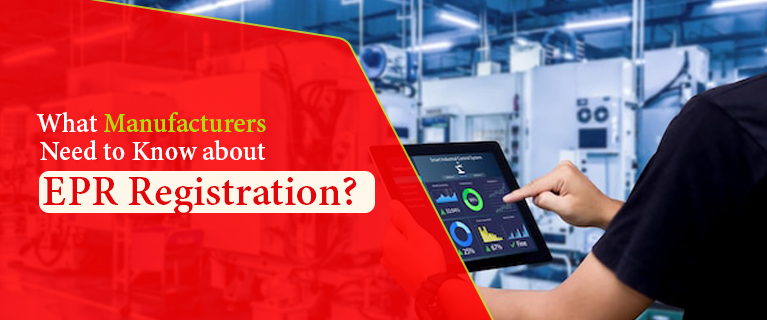EPR Registration In The Food And Beverage Industry
The Food and Beverage Industry is one of the largest and most vital sectors globally. As the demand for food and beverages continues to rise, so do the associated challenges, particularly in managing the waste generated by the industry. In this article, we will explore EPR registration in the context of the Food and Beverage Industry, its importance, and how it can drive sustainability and environmental responsibility.
Understanding Extended Producer Responsibility (EPR)
EPR is a concept that places the responsibility for the end-of-life management of products on the producers, manufacturers, and importers of these products. In essence, EPR is an approach that shifts the onus of managing the waste generated by products from consumers and local governments to the entities that produce or import those products. EPR programs aim to promote the efficient use of resources, encourage environmentally responsible product design, and reduce the environmental impact of products, particularly in their end-of-life phase.
The application of EPR varies from country to country, but it typically covers products in various categories, including electronics, packaging, batteries, and, as we'll focus on, the Food and Beverage Industry.
Read Also This - What Manufacturers Need to Know about EPR RegistrationThe Food and Beverage Industry:
The Food and Beverage Industry is a massive contributor to the global economy. However, its operations generate a significant amount of waste and environmental impact. Key areas where the industry contributes to environmental concerns include:
1. Packaging Waste: Food and beverages are packaged in various materials, including plastics, glass, and aluminium. Packaging waste is a considerable concern, as it often ends up in landfills or as litter in the environment.
2. Food Waste: The industry produces vast quantities of food products. However, a significant portion of these products goes to waste, from production and processing to distribution and consumption.
3. Energy Consumption: The energy requirements for food and beverage production, processing, and transportation are substantial, contributing to carbon emissions.
4. Water Usage: Water is a critical resource in the industry, both for agriculture and processing. Excessive water usage can strain local water resources and lead to water pollution.
5. Chemical Use: Pesticides, fertilizers, and chemicals used in food production can impact soil and water quality.
Given these environmental concerns, the Food and Beverage Industry is a prime candidate for EPR registration and sustainable practices.
The Role of EPR Registration in the Food and Beverage Industry:
EPR registration in the Food and Beverage Industry can have a significant positive impact on sustainability and environmental responsibility.
1. Reducing Packaging Waste
EPR programs encourage producers to minimize packaging waste by adopting more sustainable packaging materials, optimizing packaging design, and reducing excessive packaging. This can lead to a substantial reduction in the industry's environmental footprint.
2. Effective Recycling Programs
EPR registration promotes the establishment of efficient recycling and recovery programs. Producers are incentivized to take back and recycle packaging and materials, reducing the amount of waste sent to landfills and incineration.
3. Preventing Food Waste
EPR programs can extend to reducing food waste within the supply chain. Food producers and retailers can work together to minimize food waste, whether through better inventory management, optimized distribution, or donations to those in need.
4. Resource Efficiency
Producers are motivated to improve the resource efficiency of their operations. This includes optimizing energy use, conserving water, and reducing the overall environmental impact of food and beverage production.
5. Enhancing Product Design
EPR registration encourages producers to design products that are environmentally friendly from the outset. This means considering the entire life cycle of a product, from sourcing materials to disposal.
6. Consumer Awareness
EPR programs often involve public awareness campaigns that educate consumers about responsible consumption, recycling, and waste reduction. This can lead to more informed and environmentally conscious choices by consumers.
7. Financial Responsibility
Producers who register under EPR programs take financial responsibility for the end-of-life management of their products. This can lead to more responsible business practices and a commitment to sustainability.
Successful Examples of EPR in the Food and Beverage Industry:
Several countries have successfully implemented EPR programs in the Food and Beverage Industry. For example:
1. Germany: The Green Dot system in Germany has been instrumental in improving packaging waste management. Producers pay a licensing fee to use the Green Dot symbol, which signifies their commitment to recycling and waste reduction.
2. France: France introduced the Eco-Emballages program, which obligates producers to manage packaging waste. Producers are responsible for recycling and managing the end-of-life of their packaging materials.
3. Japan: Japan's Food Recycling Law promotes the reduction of food waste by requiring large food producers to recycle food waste. The law also encourages food donation and animal feed utilization.
Conclusion
EPR registration in the Food and Beverage Industry is a vital step toward a more sustainable and environmentally responsible future. By shifting the burden of waste management to producers, businesses are incentivized to adopt more sustainable practices, reduce waste, and minimize their environmental impact. With successful models in various countries, the Food and Beverage Industry has the opportunity to embrace EPR registration and contribute to a better and greener future.



Comments
Post a Comment